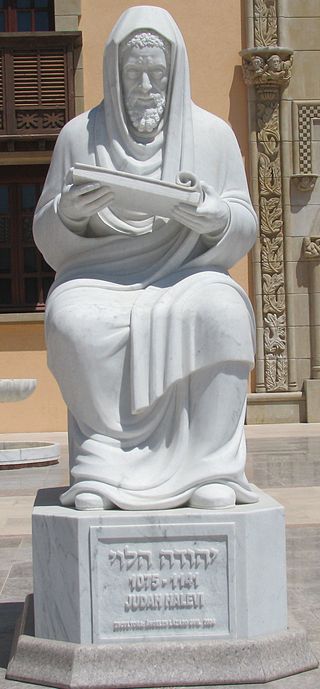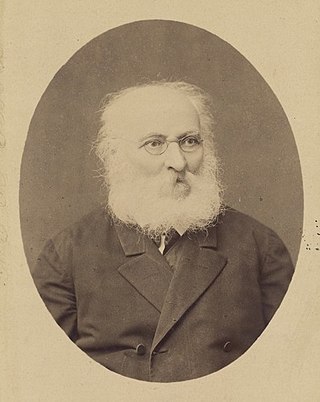
Abraham ben Meir Ibn Ezra was one of the most distinguished Jewish biblical commentators and philosophers of the Middle Ages. He was born in Tudela, Taifa of Zaragoza.

Moses ben Nachman, commonly known as Nachmanides, and also referred to by the acronym Ramban and by the contemporary nickname Bonastruc ça Porta, was a leading medieval Jewish scholar, Catalan rabbi, philosopher, physician, kabbalist, and biblical commentator. He was raised, studied, and lived for most of his life in Girona, Catalonia. He is also considered to be an important figure in the re-establishment of the Jewish community in Jerusalem following its destruction by the Crusaders in 1099.

Jewish philosophy includes all philosophy carried out by Jews, or in relation to the religion of Judaism. Until modern Haskalah and Jewish emancipation, Jewish philosophy was preoccupied with attempts to reconcile coherent new ideas into the tradition of Rabbinic Judaism, thus organizing emergent ideas that are not necessarily Jewish into a uniquely Jewish scholastic framework and world-view. With their acceptance into modern society, Jews with secular educations embraced or developed entirely new philosophies to meet the demands of the world in which they now found themselves.

Judah Halevi was a Sephardic Jewish poet, physician and philosopher. He was born in Al-Andalus, either in Toledo or Tudela, in 1075. He is thought to have died in 1141, in either Jerusalem, at that point the Crusader Kingdom of Jerusalem, or in Alexandria, Egypt.

Obadiah ben Abraham of Bertinoro, commonly known as "The Bartenura", was a 15th-century Italian rabbi best known for his popular commentary on the Mishnah. In his later years, he rejuvenated the Jewish community of Jerusalem and became recognised as the spiritual leader of the Jews of his generation.

Dunash ha-Levi ben Labrat was a medieval Jewish commentator, poet, and grammarian of the Golden age of Jewish culture in Spain. He is known for his philological commentary, Teshuvot Dunash, and for his liturgical poems D'ror Yiqra and D'vai Haser.
Abraham ben David, also known by the abbreviation RABaDRavad or RABaD III, was a Provençal rabbi, an important commentator on the Talmud, Sefer Halachot of Rabbi Yitzhak Alfasi and Mishne Torah of Maimonides, and is regarded as a father of Kabbalah and one of the key links in the chain of Jewish mystics.

Avrom Ber Gotlober, also known by the pen names Abag and Mahalalel, was a Russian Maskilic writer, poet, playwright, historian, journalist and educator. His first collection was published in 1835.
Moses ben Jacob ibn Ezra, known as Ha-Sallaḥ was an Andalusi Jewish rabbi philosopher, linguist, and poet. He was born in Granada about 1055 – 1060, and died after 1138. Ibn Ezra is considered to have had great influence in the Arabic literary world. He is considered one of Spain's greatest poets and was thought to be ahead of his time in terms of his theories on the nature of poetry. One of the more revolutionary aspects of Ibn Ezra's poetry that has been debated is his definition of poetry as metaphor and how his poetry illuminates Aristotle's early ideas. The impact of Ibn Ezra's philosophical works was minor compared to his impact on poetry, but they address his concept of the relationship between God and man.

Hebrew literature consists of ancient, medieval, and modern writings in the Hebrew language. It is one of the primary forms of Jewish literature, though there have been cases of literature written in Hebrew by non-Jews. Hebrew literature was produced in many different parts of the world throughout the medieval and modern eras, while contemporary Hebrew literature is largely Israeli literature. In 1966, Agnon won the Nobel Prize for Literature for novels and short stories that employ a unique blend of biblical, Talmudic and modern Hebrew, making him the first Hebrew writer to receive this award.

Jewish literature includes works written by Jews on Jewish themes, literary works written in Jewish languages on various themes, and literary works in any language written by Jewish writers. Ancient Jewish literature includes Biblical literature and rabbinic literature. Medieval Jewish literature includes not only rabbinic literature but also ethical literature, philosophical literature, mystical literature, various other forms of prose including history and fiction, and various forms of poetry of both religious and secular varieties. The production of Jewish literature has flowered with the modern emergence of secular Jewish culture. Modern Jewish literature has included Yiddish literature, Judeo-Tat literature, Ladino literature, Hebrew literature, and Jewish American literature.
Jedaiah ben Abraham Bedersi was a Jewish poet, physician, and philosopher; born at Béziers. His Occitan name was En Bonet, which probably corresponds to the Hebrew name Tobiah; and, according to the practices of Hachmei Provence, he occasionally joined to his name that of his father, Abraham Bedersi.
Abraham Bedersi was a Provençal Jewish poet; he was born at Béziers. The dates of his birth and death have not been ascertained.
Mekitze Nirdamim is a literary society dedicated to the retrieval, preservation, and publication of medieval Hebrew texts. It was first established at Lyck, Prussia in 1861, and is now based out of Jerusalem, Israel.
Hayyim (Jefim) Schirmann was an Israeli scholar of medieval Spanish and Italian Jewish poetry.
Isaac ben Abraham may refer to:
Abraham de Caceres or Casseres was a Dutch Jewish composer of the late baroque period.
Todros ben Judah Halevi Abulafia was a Jewish poet who wrote primarily in Hebrew. He also wrote poems in Arabic.
Meshullam ben Shelomo da Piera was a 13th-century Hebrew poet in Catalonia.